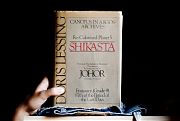
Doris Lessing
Shikasta
Canopus in Argos: Archives, Book One
I have learned that good books employ the forces of the cosmos. By cosmos I mean: the unpredictable, unknown, the omnipresent surrounding, inexhaustible, incommensurable, unseen, unheard; there’s always some other “state of being,” other invisible, invincible entities passing between us and our experiences, passing us by. Doris Lessing in Shikasta has evoked the cosmos literally, but not in the Battlestar Galactica kind of a way, no, no flashing universes or bright striking planets. Doris Lessing evokes the history of Earth, the broken, in steady cadence and seamless prose.
It is beyond me to understand what all the fuss was about back in 1979 when the book was first published. That Doris Lessing had gone spacey with her “space-fiction” really got under the critics’ skin. Shikasta was not well received. Breaking off and going one’s own way is rarely well-received; especially if that way is peppered with mysticism. It’s as if they personally got upset, for those blasted academics had erected a beautiful name in literary fiction, Doris Lessing; what was she trying to do with her sci-fi? So they put on their space-goggles to read a space-literary-fiction-bivouac-book. . . it seems so silly to me: Why not throw those stupid genres in the trash?
Critics will be critics, that’s how they got their name. Now, almost forty-years later there can be heard adequate praise. La, la, laaaa. . . that’s me singing.
We are all creatures of the stars and their forces, they make us, we make them, we are part of a dance from which we by no means and not ever may consider ourselves separate.
What brand of mysticism is that? Shall we dub it Sufi? I think I shall call it squash because to me it reads like plain truth.
“Shikasta the hurt, the damaged, the wounded one,” the broken, Shikasta, that’s us, Earth. Our fragile bonds shattered, our good vibes or Substance-of-We-Feeling or SOWF, fizzled. We consume and forget what in turn consumes us, we thrive on our own bed-bugs, our Cancer by Henry Miller, our Degenerative Disease according to the Canopeans. “War. Murder. Torture. Exploitation. Oppression and suppression. And always lies, lies, lies. Always in the name of progress, and equality and development and democracy.” Sound familiar? Turn on the news. Or don’t.
The minerals were being ripped out, the fuels wasted, the soils depleted by an improvident and short-sighted agriculture, the animals and plants slaughtered and destroyed, the seas being filled with filth and poison, the atmosphere was corrupted—and always, all the time, the propaganda machines thumped out: more, more, more, drink more, eat more, consume more, discard more—in a frenzy, a mania. These were maddened creatures, and the small voices that rose in protest were not enough to halt the process that had been set in motion and sustained by greed.
Gore Vidal complained in his critique that this evil, propounded by Shammat rebels of the galactic empire Puttiora, was not believable. This struck me as quite near-sighted. Shammat urged on evil once the Lock broke using the emanations for their own selfish motives, but Shammat never seemed to me to be the source. The source was self-promoting, like the wrong type of by-stander who cheers the other team on.
This is a catastrophic universe, always; and subject to sudden reversals, upheavals, changes, cataclysms, with joy never anything but the song of substance under pressure forced into new forms and shapes.
The cosmos may bid us to lean in one direction, sometimes with forces shoving and pushing, a commotion, at other times calmly toppling; though I believe within a directed tilt we have been given some choice. Like George Sherban, the Canopean emissary cum Youth Army leader cum human, said to his younger sister: “Rachel, I want you to listen very carefully.”
I could see in George’s face that in quite ordinary things that were said was much much more.
Before Rohanda broke and became Shikasta, when Natives and Giants lived as one, there was this amazing faculty of communication possessed by all alike. Harmony. Things “just worked.” No effort was needed to stifle an opinion in lieu of others speaking, no, their voices, their thoughts were as “one.” This ideal exists as a higher state, telepathic, oracular. To sit in with a group on either side of the linear continuum of analytical right/left thought, the voices rise round and about. To an outsider the din is hardly justified; they all arrive just short of their own tail. Democracy? Bureaucracy? What? You people who subject yourself to such madness as office meetings, political meetings, house meetings must be joking.
Harmony is the opposite of discord. It is also something you may hear from a box-seat at the orchestra.
The dance of the cosmos reminds us that humans are but a fraction of the minority. Our society claims that we as humans (mostly white humans) own a rightful superiority as Rulers of the World. Shikasta delightfully proves the shameful falsity in such machinations. Shikasta reads the history of millions of years. We are but a fraction of the minority. Cosmically, humans don’t contribute a damn thing but our own destruction. But despite all prophesied doom and gloom, Doris Lessing has given me a vision of my better self. The self who bears no competition to gain Rule, my meek self, my humble, the great glories in the thirst for better knowledge, the firmament of my uniqueness in which I stand.
I found no fault with Doris Lessing’s choice of a happy ending. Our broken species needs what hope we can get.
· · · · · · · · · · · · · · · · · · · ·